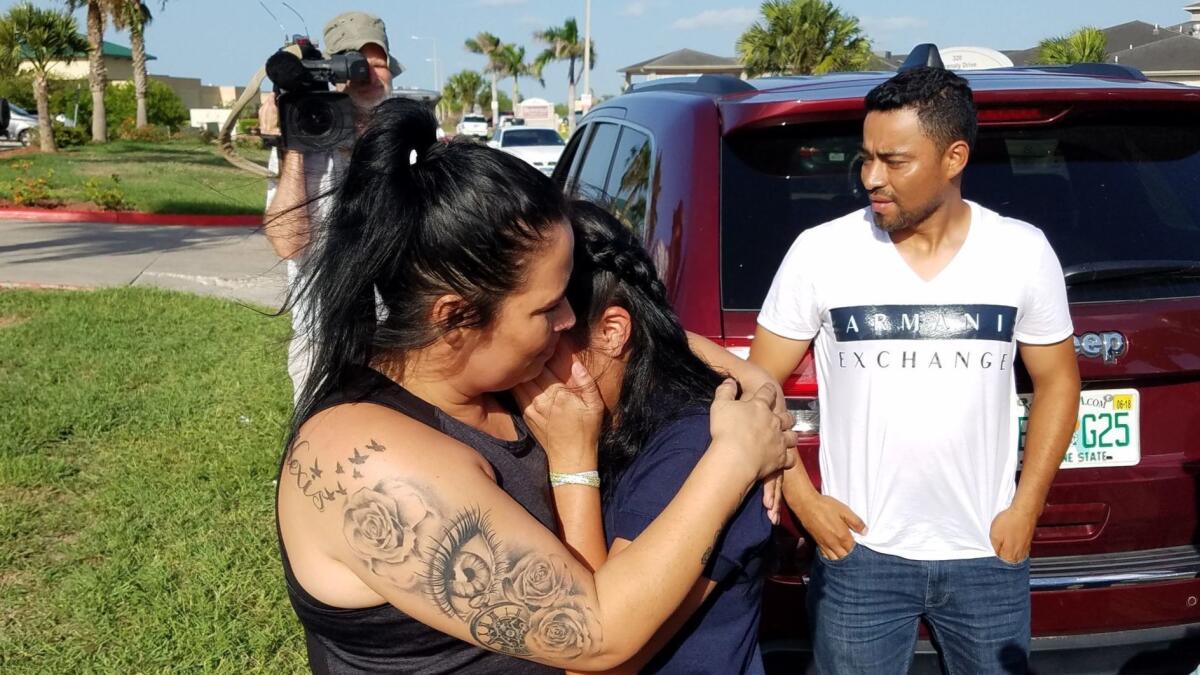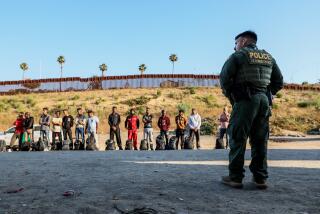What it took to reunite one immigrant family separated under U.S. ‘zero tolerance’ policy

- Share via
Reporting from Brownsville, Texas — There was no shade, no escape from the heat, for the immigrant mother waiting for hours Wednesday outside a south Texas shelter in this border city to reclaim her 17-year-old daughter.
Her experience shows just how difficult it will be to reunite thousands of mostly Central American children separated from their parents under the Trump administration’s “zero tolerance” policy.
Reina Isabella, who asked to be identified only by her first and middle name, had not seen her daughter Diana in 40 days.
The two were fleeing violence when they left San Salvador, where Reina, a printer, also failed to find work, she said. Soon after crossing the Rio Grande into the Texas town of Hidalgo, they were caught by Border Patrol.
Reina, 40, was taken to federal criminal court in nearby McAllen at 3 a.m. and charged with crossing the border illegally.
When she was returned to the Border Patrol processing center, officials told her Diana had been taken away.
They wouldn’t say where, or let her phone her daughter, said Reina, who was moved to the T. Don Hutto detention center more than 300 miles north near Austin.
There she met staff from Austin-based nonprofit Grassroots Leadership, which helped her as she applied for asylum based on her fear of returning to El Salvador.
She was released Monday, after an immigration judge granted her $1,500 bond, which the nonprofit paid. The next day, staffers drove her to Brownsville in hopes she would get to see Diana, who she had learned was being held there at the federally contracted Nueva Esperanza shelter.
The two were allowed to visit for a few hours.
Diana, the youngest of her three children, seemed fine physically, Reina said. She had always been a strong, athletic child. But Reina could see the separation was wearing on her psychologically.
Reina completed reams of forms required to reclaim her daughter from the custody of the Department of Health and Human Services, providing identification, fingerprints and proof she had a place to stay — with a friend in Maryland.
But that wasn’t enough for her to reclaim her daughter Tuesday. Grassroots Leadership staff put her up at a motel to wait. Caseworkers at the shelter said it could take days.
But the next morning, they learned Diana would be released soon, and they rushed to the shelter at 10:30 a.m. with a staffer from the office of local Democratic U.S. Rep. Filemon Vela, who has spoken out against family separations.
There, they waited in 95-degree heat as the hours ticked by and Homeland Security officials conferred with counterparts at HHS. Inside, Diana was waiting too, her bag packed.
Workers came and went as shifts changed. White vans packed with children arrived. No other parents appeared to claim them.
At 6:20 p.m., Diana walked out of the shelter in jeans, a blue T-shirt and sparkly bracelets, climbed into Grassroots Leadership’s waiting car and her mother’s arms. Both cried as Diana mashed her face into her mother’s arm, near a tattoo that said “Blessed.”
“It’s really hard for parents because we came to this country for a better future for our children,” Reina said, calling the separations “a major injustice not just for us parents but for the children.”
Advocates accompanying her questioned how the government can expect immigrants to navigate the reunification process without help.
“She had a lot of support, and this is just one child,” said Claudia Muñoz, Grassroots Leadership’s immigration programs director. “There are over 2,000 still in custody.”
Reina and her daughter were planning to leave the next day for Maryland. She may have to return to attend immigration court near Austin on July 26, unless her case is transferred.
Grassroots Leadership staffers were staying in Brownsville. The next day, Thursday, they helped two more mothers try to reclaim their children. When officials dragged their feet, the group bought a tent and threatened to camp outside the shelters. The families were eventually reunited, and staffers turned their attention to more than a dozen mothers they know at the nearby Port Isabel Detention Center, at risk of being deported without their children.
Twitter: @mollyhf
UPDATES:
July 13, 3:45 p.m.: This article was updated with the reunification of two more women with their children on Thursday.
This article was originally published July 12 at 3 a..m
More to Read
Sign up for Essential California
The most important California stories and recommendations in your inbox every morning.
You may occasionally receive promotional content from the Los Angeles Times.











